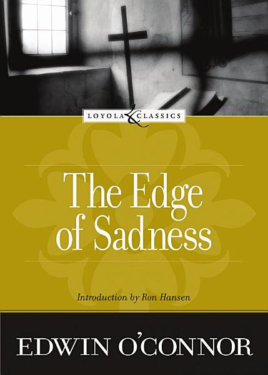
Faith & Thought
Preparing a series of short lectures on the Catholic novel for NET/TV has been a rewarding experience for me. Going back over novels that I have read many years ago, at least one back in high school, is like renewing old friendships.
I confess that no novel that I have chosen to present has disappointed me. What has struck me as strange is both how much I have forgotten about many of the novels, but also how some scenes in some novels remain vivid even after 50 years. Also what has surprised me is my evaluations of some of them have changed, some significantly.
An example of a scene that seems to be remembered by many who have read Myles Connolly’s “Mr. Blue” is the scene near the end of the novel, when at the consecration of a Mass in the concentration camp, the Second Coming of Christ happens. This scene is in a screenplay that Mr. Blue has written.
I first read Edwin O’Connor’s “The Edge of Sadness” when it was first published almost 60 years ago. I recall liking it very much. That was the reason I chose it as one of the novels for the television series.
My second reading of the novel a few months ago, however, has led me to evaluate it, not only as one of the best novels I have presented, but as one of the best novels I have ever read. I think it is a truly great novel. Dramatizing the life of his main character, Father Hugh Kennedy, O’Connor probes deeply the human mystery.
My copy of “The Edge of Sadness” has an introduction by novelist Ron Hansen, who notes that he has Jesuit friends who told him that O’Connor’s novel was the first novel they were permitted to read in their training. Hansen guesses that this could not have been because it was excellent preparation for the functions of the priesthood, but rather because it “so well describes a very American variation on St. John of the Cross’ ‘Dark Night of the Soul.’”
The greatness of “The Edge of Sadness” lies not in its insider’s view of ecclesiastical life, or in its portrayal of steely faith, bloody martyrdom, or the heroic struggle to seek out a seemingly ever-withdrawing God. Instead, it lies in its evocation of the age-old maladies of selfishness, lethargy, indifference and bleakness of soul.
One critic, in 1961, called Father Hugh Kennedy “the first human priest to emerge from the pages of an American novel.” And it is that intensely honest and unsentimental perspective that gives resonance to Edwin O’Connor’s novel even today.
There is a term, “spiritual reading,” frequently used to describe books that deal directly with religious topics with the intention of inspiring the reader to grow in his or her relationship with God. There are many such books.
Thomas à Kempis’ “The Imitation of Christ” comes to mind as a classic example of what many mean by “spiritual reading.” In recent years I have found it difficult to use the term in that way because I have come to believe that all literature, all stories that dramatize some character or characters’ relationship with God, can be inspiring and can help the reader’s relationship with God.
Many years ago, a Catholic nun told me that she often found novels more helpful in her life as a religious than what was usually described as spiritual reading. When I heard her comment, I was initially confused by it, but now I think I understand what she meant.
The Holy Spirit breathes where it will. Great stories can inspire us. That is one of the reasons that I am trying to promote the Catholic novel on television.
Several times while reading “The Edge of Sadness,” I marveled at O’Connor’s insights, not only into the life of priests, but into the Christian life.
A novel can give us insights, not only into the lives of the characters in the novel, but also insights into our own lives. Great writers are able to unveil universal truths through their depiction of fictional characters.
I suspect that in reading a great novel we are ultimately, in some way, reading about ourselves. I don’t completely understand how the great storytellers do this, but I know that their talent and skill in doing it is one of the reasons they are considered great storytellers.
The great novelists see what the rest of us miss, and then they share their insights with us. Their insights can enrich our lives enormously. I wonder if all great novels are really about all of us, if every great novel reveals something deep about human nature.
What was the last great novel that you read? Did it illuminate your life?
Lauder is a philosophy professor at St. John’s University, Jamaica. He presents two 15-minute talks from his lecture series on the Catholic Novel, every Tuesday at 9 p.m. on NET-TV.
